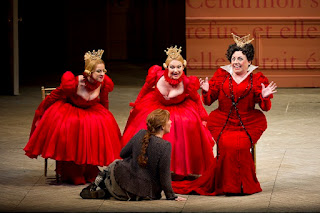 |
| The Garrick Theatre |
Lately I have been a little slow with new posts, since I've been taking advantage of what London does best: theatre and music. The place is a cultural cornucopia! As I've seen so many excellent shows, I will tell you about them in one post...here goes:
Theatre: Pygmalion by George Bernard Shaw
The play on which the movie "My Fair Lady" is based is playing at the Garrick Theatre, with Rupert Everett as an unlikely but successful Professor Higgins. The Eliza Doolittle is less successful (Kara Tointon) - she is sadly unbelievable as a rough-speaking flower girl, and there isn't much in the way of energy between the couple. Diana Rigg (remember Emma Peel in 'The Avengers' in the 1960s? or was it 70s?) is an excellent Mrs Higgins, and I liked the other cast members too.
As you may know, George Bernard Shaw wrote a number of different endings for his play. The director here, Philip Prowse, chose a kind of 'women's lib' version where Eliza becomes instantly desirable when she displays some independence of spirit: politically correct but slightly less like real life, IMO. But I could spend ages talking about this - it is not irrelevant to consider the myth of Pygmalion.
On the subject of the English language, the play program had an interesting article about Shaw, who served on a committee called "The Advisory Committee on Spoken English", and campaigned for much of his life for what he called an 'English Alphabet'. It contained 42 letters instead of 26. At one stage he put his case on economic grounds: for example, his surname had two sounds but he had to spell it with four letters - a "100 per cent loss of time, labour, ink and paper." The Shaw Alphabet was in fact published in 1962 with funds left by Shaw in his will.
Opera: Cendrillon by Jules Massenet
 |
| Pretty in red |
 |
| You have to love the coach |
 |
| Alice & Joyce...er, Prince Charming and Cinderella |
Here's the Guardian's review.
Theatre: Rosenkrantz and Guildenstern are Dead by Tom Stoppard
And so from the frippery and fantastical to the cerebral and...well, fantastical. Tom Stoppard is always a bit (actually rather a lot) cerebral, and this play is no different. Which is to say, it is very clever, and repays close attention. I first came across it as a school text many moons ago, and thus had forgotten most of it. But I'd always recalled the first scene, where R & G are flipping coins and 'heads' always comes up. As you may know, the two are minor characters in Shakespeare's "Hamlet". Stoppard has taken them, re-imagined them, and used them as allegories for all kinds of things. What these things might be seem to vary depending upon the audience member. There are lots of references to philosophy, some self-deprecating remarks about England and the English (Hamlet et al, and presumably R & G, being Danish, you'll recall) and a very interesting major character with no name, identified in the program as "The Player".
 |
| Just a couple of (possibly dead) guys trying to figure things out |
 |
| R & G and The Player |
One interesting feature of this production, and one which many theatre companies may be unlikely to be able to boast, was that the cast and director had the benefit of Stoppard actually consulting with them at rehearsals. Sheesh! If they can't do a good job after that...but they did.
Concert: Aurora Orchestra 'When Doves Cry'
 |
| LSO St Luke's |
 |
| Nicholas Collon in action |
The program was loosely based on the subject of nature - recorded birdsong was played at interval, there were some abstract paintings displayed....here's the musical program:
Ralph Vaughan-Williams: 'The Cloud-Capp'd Towers'; 'Flos Campi': totally beautiful choral music and I'm going to search out a recording immediately.
Brett Dean: 'Pastoral Symphony': included recorded sounds of chain saws chopping down trees, as well as birds, some very loud percussion, wild and discordant and exciting.
Beethoven: 'Symphony No.6 (Pastoral)': I guarantee you'll all know this one if you heard it. It was wonderfully played.
The encore was a version of 'Danny Boy' with the choir singing without words. It was beautiful enough to bring a tear to the eye. Ineffably sad.
I will be seeking out Aurora Orchestra and Choir of London again.
"To launch a new orchestra in the cut-throat musical marketplace that is London requires courage and conviction. To sustain it through five seasons, during which you programme everything from the Baroque sounds of Gabrieli and Lully to the avant-garde scores of Berio and Adams, shows brilliance as well as bravado." (The Times, 2011)
I guess that's enough performance-going for one week. I hope you enjoyed yourself - I did.



No comments:
Post a Comment